九种英语同义句转换
常见同义句转化九大句型
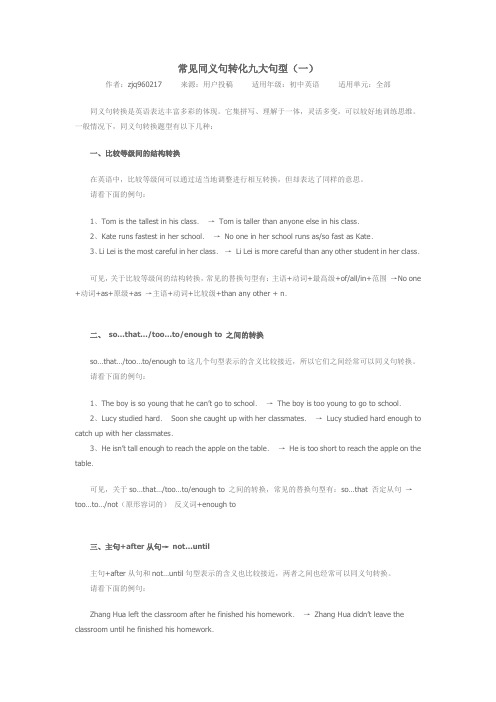
常见同义句转化九大句型(一)作者:zjq960217 来源:用户投稿适用年级:初中英语适用单元:全部同义句转换是英语表达丰富多彩的体现。
它集拼写、理解于一体,灵活多变,可以较好地训练思维。
一般情况下,同义句转换题型有以下几种:一、比较等级间的结构转换在英语中,比较等级间可以通过适当地调整进行相互转换,但却表达了同样的意思。
请看下面的例句:1、Tom is the tallest in his class.→Tom is taller than anyone else in his class.2、Kate runs fastest in her school.→No one in her school runs as/so fast as Kate.3、Li Lei is the most careful in her class.→Li Lei is more careful than any other student in her class.可见,关于比较等级间的结构转换,常见的替换句型有:主语+动词+最高级+of/all/in+范围→No one +动词+as+原级+as →主语+动词+比较级+than any other + n.二、so…that…/too…to/enough to 之间的转换so…that…/too…to/enough to这几个句型表示的含义比较接近,所以它们之间经常可以同义句转换。
请看下面的例句:1、The boy is so young that he can’t go to school.→The boy is too young to go to school.2、Lucy studied hard.Soon she caught up with her classmates.→Lucy studied hard enough to catch up with her classmates.3、He isn’t tall enough to reach the apple on the table.→He is too short to reach the apple on the table.可见,关于so…that…/too…to/enough to 之间的转换,常见的替换句型有:so…that 否定从句→too…to…/not(原形容词的)反义词+enough to三、主句+after从句→not…until主句+after从句和not…until句型表示的含义也比较接近,两者之间也经常可以同义句转换。
同义句转换十二类型解析及练习
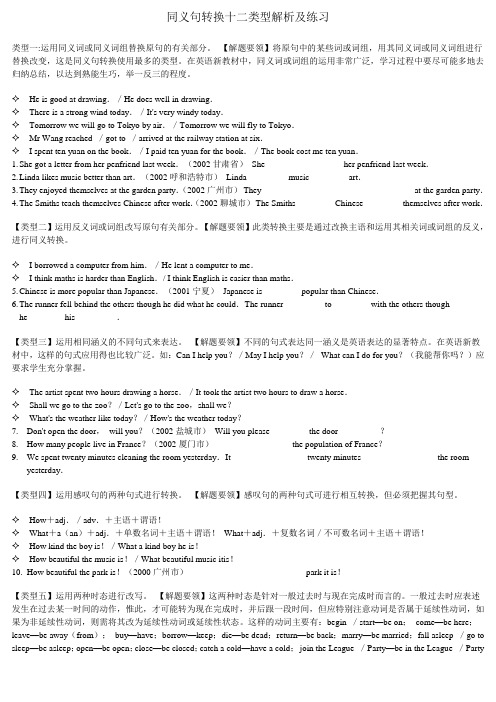
同义句转换十二类型解析及练习类型一:运用同义词或同义词组替换原句的有关部分。
【解题要领】将原句中的某些词或词组,用其同义词或同义词组进行替换改变,这是同义句转换使用最多的类型。
在英语新教材中,同义词或词组的运用非常广泛,学习过程中要尽可能多地去归纳总结,以达到熟能生巧,举一反三的程度。
✧He is good at drawing./He does well in drawing.✧There is a strong wind today./It's very windy today.✧Tomorrow we will go to Tokyo by air./Tomorrow we will fly to Tokyo.✧Mr Wang reached /got to /arrived at the railway station at six.✧I spent ten yuan on the book./I paid ten yuan for the book./The book cost me ten yuan.1.She got a letter from her penfriend last week.(2002甘肃省)She________ _________ her penfriend last week.2.Linda likes music better than art.(2002呼和浩特市)Linda________ music ________ art.3.They enjoyed themselves at the garden party.(2002广州市)They________ ________ ________ ________ at the garden party.4.The Smiths teach themselves Chinese after work.(2002聊城市)The Smiths ________ Chinese ________ themselves after work.【类型二】运用反义词或词组改写原句有关部分。
同义句转换的常见方法

同义句转换的常见方法同义句转换的常见方法所谓同义句转换就是将一个句子用另一种形式表达出来,而且意思不变。
下面店铺整理了同义句转换的常见方法,希望对你有所帮助!同义句转换是什么意思同义句转换就是把一个句子用另外一种结构表达出来,当然要保证句意不能改变。
同义词简介同义词,是指词汇意义相同或相近的词语,如:美好和美妙、懒惰和怠惰、“枯萎”和“干枯”、“宽敞”和“宽阔”。
与“该词”意思相近的词为同义词。
(1)从词语的搭配上:如“交流”和“交换”,“交流”多偏重于虚的事物,“交换”多偏重于实的东西(2)从语法功能上辨析:“公然”、“公开”公然;只能当状语。
“公开”可以充当状语、谓语、定语等。
同义句转换的九种类型同义句转换题是近几年中考英语的一个常考题型,其出题形式通常是同时给出两个句子,第一句完整,第二句中设有几处空格,要求考生填入适当的词或词组,使第二句的意思与第一句意思相同。
它综合考查考生的语法、词汇、短语或习惯用语和句型结构等知识,要求运用所学的词汇、语法知识和句型结构填写句子,使句子结构完整、逻辑合理、语法知识无误、意思与所给句子相同。
通过对近几年的中考英语试题中同义句转换题的分析,我们发现中考英语同义句转换题主要考查以下几个方面:一、运用同义词(组)进行转换用同义词或同义词组对原句中的某些词或词组进行替换,注意转换后的词或词组的词形变化要与句子其他成分相适应。
如:1. That day we could see flowers here and there.That day we could see flowers __________.分析:答案为everywhere。
everywhere与here and there都表示“到处”。
2. The teacher always takes good care of the children in the school.The teacher always_______ ______the children well in the school.分析:答案为looks after。
人教版英语同义句句型转换附练习及答案
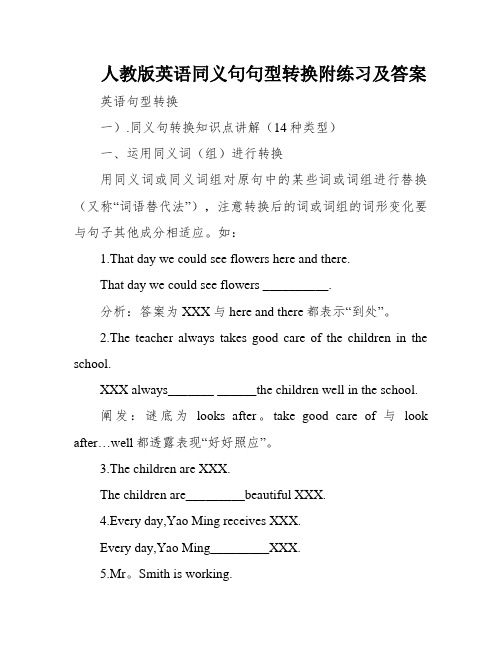
人教版英语同义句句型转换附练习及答案英语句型转换一).同义句转换知识点讲解(14种类型)一、运用同义词(组)进行转换用同义词或同义词组对原句中的某些词或词组进行替换(又称“词语替代法”),注意转换后的词或词组的词形变化要与句子其他成分相适应。
如:1.That day we could see flowers here and there.That day we could see flowers __________.分析:答案为XXX与here and there都表示“到处”。
2.The teacher always takes good care of the children in the school.XXX always_______ ______the children well in the school.阐发:谜底为looks after。
take good care of与look after…well都透露表现“好好照应”。
3.The children are XXX.The children are_________beautiful XXX.4.Every day,Yao Ming receives XXX.Every day,Yao Ming_________XXX.5.Mr。
Smith is working.Mr。
Smith is__________ __________.答案:1.in 2.hears from 3.at work二、运用反义词(组)的否定式进行转换即用反义词或词组的否定式表达与原句相同的意思,主要考查学生对反义词(词组)的积累和换位思维的能力。
如:1.It’s clear that this visit is d ifferent from last time.It’s clear that this visit is not the___ ___last time.分析:答案为same as。
同义句转换十二类型解析及练习
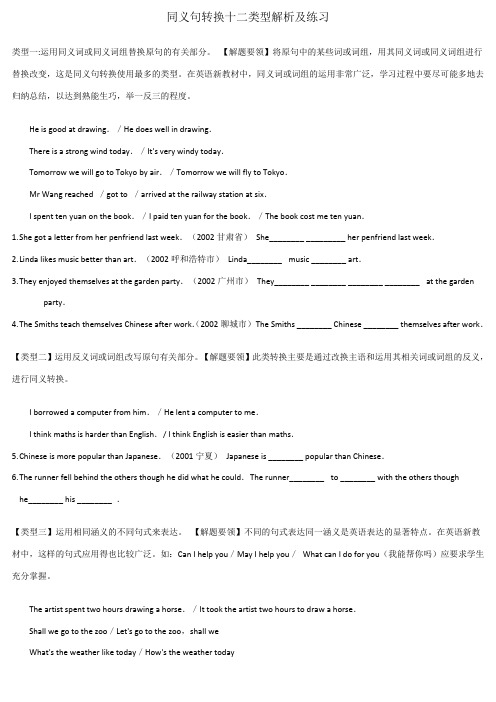
同义句转换十二类型解析及练习类型一:运用同义词或同义词组替换原句的有关部分。
【解题要领】将原句中的某些词或词组,用其同义词或同义词组进行替换改变,这是同义句转换使用最多的类型。
在英语新教材中,同义词或词组的运用非常广泛,学习过程中要尽可能多地去归纳总结,以达到熟能生巧,举一反三的程度。
He is good at drawing./He does well in drawing.There is a strong wind today./It's very windy today.Tomorrow we will go to Tokyo by air./Tomorrow we will fly to Tokyo.Mr Wang reached /got to /arrived at the railway station at six.I spent ten yuan on the book./I paid ten yuan for the book./The book cost me ten yuan.1.She got a letter from her penfriend last week.(2002甘肃省)She________ _________ her penfriend last week.2.Linda likes music better than art.(2002呼和浩特市)Linda________ music ________ art.3.They enjoyed themselves at the garden party.(2002广州市)They________ ________ ________ ________ at the gardenparty.4.The Smiths teach themselves Chinese after work.(2002聊城市)The Smiths ________ Chinese ________ themselves after work.【类型二】运用反义词或词组改写原句有关部分。
英语 同义句转换

英语同义句转换以下是一些常见的英语同义句转换方法:1. 使用同义词或近义词:通过替换某些单词来改变句子的表达方式,而不改变其基本含义。
例如:- I like apples. → I enjoy apples.- She is beautiful. → She has a pretty face.2. 变换词序:通过改变句子中单词的顺序来实现同义句转换。
例如:- I will go to the store. → The store is where I will go.- He doesn't like football. → Football is not liked by him.3. 运用不同的句型结构:使用不同的句型来表达相同的意思。
例如:- She is tall. → Her height is considerable.- We went to the park by bus. → We took a bus to the park.4. 正反表达:使用肯定和否定形式来表达相同的含义。
例如:- He is intelligent. → He isn't stupid.- I agree with you. → I don't disagree with you.5. 用被动语态替换主动语态:将句子中的主语和动作执行者进行调换。
例如:- They built the house. → The house was built by them.- John wrote the letter. → The letter was written by John.这些是一些常见的同义句转换方法,通过使用不同的词汇、词序、句型或语态,可以丰富句子表达的方式,使语言更加灵活多样。
请注意,在进行同义句转换时,要确保新句子的语法和语义正确,并与原句保持基本相同的含义。
(完整版)初中英语同义句转换大全
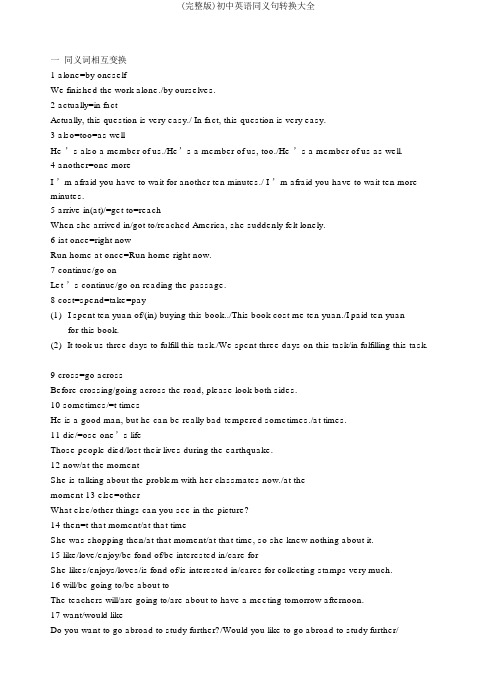
一同义词相互变换1 alone=by oneselfWe finished the work alone./by ourselves.2 actually=in factActually, this question is very easy./ In fact, this question is very easy.3 also=too=as wellHe ’s also a member of us./He’s a member of us, too./He ’s a member of us as well.4 another=one moreI ’m afraid you have to wait for another ten minutes./ I ’m afraid you have to wait ten more minutes.5 arrive in(at)/=get to=reachWhen she arrived in/got to/reached America, she suddenly felt lonely.6 iat once=right nowRun home at once=Run home right now.7 continue/go onLet ’s continue/go on reading the passage.8 cost=spend=take=pay(1)I spent ten yuan of/(in) buying this book../This book cost me ten yuan./I paid ten yuanfor this book.(2) It took us three days to fulfill this task./We spent three days on this task/in fulfilling this task.9 cross=go acrossBefore crossing/going across the road, please look both sides.10 sometimes/=t timesHe is a good man, but he can be really bad-tempered sometimes./at times.11 die/=ose one’s lifeThose people died/lost their lives during the earthquake.12 now/at the momentShe is talking about the problem with her classmates now./at themoment 13 else=otherWhat else/other things can you see in the picture?14 then=t that moment/at that timeShe was shopping then/at that moment/at that time, so she knew nothing about it.15 like/love/enjoy/be fond of/be interested in/care forShe likes/enjoys/loves/is fond of/is interested in/cares for collecting stamps very much.16 will/be going to/be about toThe teachers will/are going to/are about to have a meeting tomorrow afternoon.17 want/would likeDo you want to go abroad to study further?/Would you like to go abroad to study further/18 can/be able to/have the ability to doCan you tell me the way to the library?/Are you able to tell me the way to the library?/Do you have the ability to tell me the way to the library?19 visit/call onLin Tao visited/called on his grandparents last week.20 favorite/like bestWhat ’s your favorite sport?/What sport do you like best?21 happen/take placeWhat happened?/What took place?22 decide/make a decision/make up one ’s mindShe can’tdecide/make a decision/make up her mind where to go.23 found/establish/set upThe students founded/established/set up a group to protect the environment.24 finally/at last/in the endFinally/At last/In the end, she won the race.25 leave/be awayHe left yesterday./He has been away for a day.26 return/give backHe hasn’treturned the book to me./He hasn ’tgiven the book back to me.return/go backHe will go back/return in a month.27 why/what for/how come-She cried so badly.–How come?What did she cry so sadly for?/Why did she cry so badly?28 over/more thanOver/More than a hundred people tried this new kind of food.29 whatever/no matter whatWhatever/No matter what you find in the box, they belong to Amy.30 whenever/no matter whenWhenever/No matter when you come to see me, I will treat you as my relative.31 walk/ go ⋯ on footDo you walk to school every day?/Do you go to school on foot every day?32 should/ought to/be supposed toWe should/ought to/are supposed to use both sides of the paper to reduce wastes.33 population/peopleWhat is the population of China?/How many people are there in China?34 quit/stop/drop/give upMy father quitted/stopped/dropped/gave up smoking.35 maybe/perhaps/may beMaybe/Perhaps it is not my pen./ The pen may not be mine.二同相互1 a lot of/lots ofA lot of/Lots of artists will show their faces at the party.2 all over the world/around the worldEnglish is spoken widely all over the world./around theworld 3 not as(so)⋯ as/less thanThis book is not as(so) interesting as that one./That book is more interesting than this one.4 as⋯ as possible/as⋯ as sb canRun home as fast as possible/as fast as you can to tell your mother the good news.5 at risk/in danger/in troubleThe pandas in our country are at risk./in trouble/indanger 6 at the age of⋯/when sb.+be+ ⋯years oldHis parents died when he was six years old./His parents died at the age of six.7 because of/due to/as a result of/with one ’s help/thanks toBecause of?/Due to/As a result of his help, he passed this exam.With his help/With the help of him, he passed the exam./Thanks to his help, he passed the exam.8 be careful/look out/take careLook out!/Be careful/Take care! The flood is coming.9 be worried about/worry about’tstop his following oral test. Liu Ming is worried about his following oral test./Liu Ming can10 both ⋯ and⋯/not only ⋯but also⋯He is not only a singer but also a doctor./He is both a singer and a doctor.11 be good at/do well inHe is good at drawing./He does well in drawing.12 be proud of/take pride inWe are all proud of our country ’s astronaut./He takes pride in our country ’s astronaut.13 come up with/think of/have an ideaTome came up an idea./Tom thought of an idea./Tom had an idea.14 ride a bike/go ⋯ by bikeHe often rides a bike to work./He often goes to work by bike.15 come from/be fromWhere do you come from?/Where are you from?16 have a good time/enjoy oneself//play happilyWe had a good time/enjoyed ourselves/played happily on Christmas Day.17 have a pain in head/have a headacheHe didn ’tgo to school today, because he had a pain in head./had a headache18 hear from/receive(get) a letter fromShe is very happy to hear from/receive a letter from a Canadian friend.19 had better do/It ’s best to doYou had better read in the sun./It ’s best for you to read in the sun.20 how about/what aboutHow about/What about going skating?21 in order to/in order that/to do/so thatHe worked day and night to be a successful man./He worked day and night in order to be a successful man./He worked day and night in order that he could be a successful man./He worked day and night so that he could be a successful man.22 keep off/keep away fromKeep off /Keep away from the grass!23 in/wearShe is in/wears a white dress today.24 keep sb. from doing/stop sb. (from) doing/prevent sb. (from) doingTrees can stop the soil flowing away./ Trees can prevent the soil flowing away./Trees can keep the soil from flowing away.25 learn ⋯by oneself/ teach oneselfNobody taught him. He learnt it by himself./He taught himself.26 like ⋯ better than/prefer⋯ to⋯ /prefer to do ⋯ rather than do ⋯John likes swimming better than skating./John prefers swimming to skating./John prefer toswim rather than skate.27 long, long ago/once upon a timeLong, long ago/Once upon a time, there was a beautiful princess living in an old castle.28 look after well/take good care ofThanks for looking after my cat /taking good care of my cat well while I was away.29 no longer/not ⋯any longerShe is no longer a little girl./She is not a little girl any longer.30 shall we/Let ’s..Shall we watch the film together?/Let ’s watch the film together.31 take part in/join in/participate inHe took part in /joined in/participated in the match.32 too⋯ to/so⋯that⋯ /enough to⋯He is too busy to visit us./He is so busy that he can ’tvisit us./He is not free enough to visit us.三同句型相互1运用两种(一般去和在达成相互)(1)He left last year.(2)He has been away for one year.(3)He has been away since a year ago.(4)It is a year since he left.(5)One year has passed since he left.2最高等和比较级的相互变换(1)He is the tallest student in his class.(2)He is taller than any other student in his class.(3)He is taller than the other students in his class.(4)No one else is taller than him in his class.3运用两种语态(主动语态和被动语态相互变换)4叹息句的两种句型之间相互变换5运用关系词语归并句子(1)Amy can ’tdance. Susan can’t,either. Neither Amy nor Susan can dance.(2)I has eaten breakfast and my mother has eaten it, too.Both my mother and I have eaten breakfast.6 运用复合句和不定式相互变换(1)I hope that I can visit the moon one day./I hope to visit the moon one day.(2)He told me how he could use a computer./He told me how to use a computer.7 运用不一样的句式构造相互变换(1)She wants to go shopping and her friends want to go shopping, too./She wants to go shopping,and so do her friends.(2)He went to bed after he finished his homework./He went to bed after finishing hishomework./He didn ’tgo to bed until he finished his homework.(3)Come on, or we ’ll miss the early bus./If we don ’thurry, we ’ll miss the early bus.(4)The man gave us a talk last week, and he will give us another talk this week./The man whogave us a talk last week will give us another talk this week.8 用 it 做形式主语相互变换(1)He can finish the work easily./It is easy for him to finish the work.(2)We found it hard to shake./We found it was hard to skate.四实战操练1People everywhere sat and laughed at them until the tears ran down their faces.People ______ and _______sat and laughed at them until the tears ran down their faces.2Fred was visiting his mother on her 95 th birthday.Fred was visiting his mother _______ she was ______ years old.3She lives alone.She lives ________ __________.4 Due to the way they eat, they have a high rate of cancer and heart disease.________ ________ the way they eat, they have a high rate of cancer and heart disease.5 But it took her a long time to find out.But she ______ a long time _______ out.6 Ten years later, Tom became a strong boy and became a good swimmer, too.Ten years later, Tom became _______a strong boy ________ a good swimmer.7 Shy people are also good at working with others because they think more for other people.She people also ________ ______ in working with others because they think more for other people.8 Mark decided to go sailing in his boat with his friend Dan.Mark _______ a ________ to go sailing in his boat with his friend Dan.9 Once there was something wrong with a machine in a factory.Once a machine in a factory ________ __________.10 When parents have poor eating habits, their children usually do, too.When parents have poor eating habits, _______ ________ their children.11 In the computer game houses, it takes people a lot of money competing with the machines. People _____ ______ money in competing with the machines in the computer games houses.12 When the local police began to look for the pigs, newspaper reporters from around the country joined them.When the local police began to look for the pigs, newspaper reporters from ________ _______ the country joined them.13 When he first reached the island, he didn ’tknow what he could find in this strange place. When he first _________ _______ the island, he didn’tknow what he could find in this strange place.14 Some dentists say that chewing sugarless gum can help take care of people ’s teeth.Some dentists say that chewing sugarless gum can help ________ ________ people ’s teeth.15 He was different from other children.He was _______ the ______ as other children.16 Bob is twice as old as Jack, so he is now thirty.Jack is _______ years ________ than Bob.17 I teach something to air hostesses.Air hostesses ________ something _______ me.18 The world is full of variety.The world is ________ _________ variety.19 To his surprise, the taste was nice.He was ______ ______ the taste was nice.20 Once in the area, a car s almost a must.You _______ ______ take a car in the area.21 But when you are joined to the Internet, there are many things you can do.But when you are joined to the Internet, there are _________ _______ things you can do.22 Beijing will be rainy.There will be _______ ________ Beijing.23 Mrs Smith and her friends worked hard and the idea was interesting to more and more peopleover the country.Mrs Smith and her friends worked hard and more and more people over the country became ___________ _______ the idea.24 But now there is a Winter Swimming Club and it has over 2,000 members.But now there is a Winter Swimming Club and it has _________ ________ 2,000 members.25 Before crossing the road, stop and look both ways.Before ______ _______ the road, stop and look both ways.26 We call this mark “watermark”.This mark ____ ____ “watermark ”.27 They hoped the government would act quickly to conserve nature.They hoped the government would act quickly _______ _______ to conserve nature.28The Komodo lizard is the world ’s largest lizard.The Komodo lizard is larger than ______ _____ lizard in the world.29We haven’tdone anything to improve the exam system.We have _______ _______ to improve the exam system.30It is much harder to do it with TV or radio advertisements.It is much ______ ________ to do it with TV or radio advertisements.31He was unable to walk any more.He ______ _______ walked.32The bookshelf was too heavy for Miss Green to carry.The bookshelf was _____ heavy ______ Miss Green didn ’tcarry it.33In order to solve this population problem, China has begun a “one-child ’policy.China has begun a “one-child ”policy ______ ________ it solved this population problem.34 He scored more goals than anyone else on his team.He scored _______ _______ goals on his team.35 He spent very little time at school, perhaps no more than a year in all.It _______ _______ very little time at school, perhaps no more than a year in all.36 A school inspector was coming to visit a school.A school inspector was _____ a visit _____ a school.37 Why not look at the funny side and laugh instead?_________ ________ you look at the funny side and laugh instead?38 Good movies are the ones that you remember and like to see another time.Good movies are the ones that you remember and like to see ________ than _______.39 Many public people use web blogs to express their thoughts.Many public people use web blogs ________ ________ their thoughts.40 I think maybe it was left on the shelf in the bedroom.I think it _______ _____ left on the shelf in the bedroom.41 Both my father and my mother came from towns in Mexico.Both of _____ _______ came from towns in Mexico.42When Bloom was 16, he moved to London.At the _______ _____ 16, Bloom moved to London.43I was born in Amsterdam and lived there for many years.I ________ ______ in Amsterdam.44Nobody had ever seen such a big orange.Nobody had ever seen _____ big ________ orange.45Sometimes she only sleeps for no more than four hours.________ ________ she only sleeps for no more than four hours.46She bought me many presents.She bought many presents ______ ______.47The winter will be full of happiness by your own hands.The winter will be ______ ________ happiness by your own hands.48They all agreed with me.They all ______ yes ________ me.49Beautiful flowers need pollinating.Beautiful flowers need _______ _______ pollinated.50The girl smiled sweetly, so he felt very happy.The _____ smile of the girl ______ him very happy.51I don ’tlike growing flowers. Mary doesn ’tlike growing flowers, either._______ I ______ Mary likes growing flowers.52Giving makes people happy, not only those who receive, but also those who give. Giving makes people happy, ________ those who receive _______ those who give.53 Your promises are too big, and then they won ’tbe able to win people ’s trust. Your promises are ______ big ___ be able to win people ’s trust.54 What a serious thing a promise is!_________ _______ a promise is!55 They only want to win.They want _______ _______ to win.56 The better you get along with others, the easier it is for you to succeed.Get along _______ with others and that helps you succeed ______.57 It was stuck and he couldn ’ttalk or breathe.It was stuck and he could _______ talk ______ breathe.58 What do you think of the music?_______ do you ________ the music?59 I am 190cm and Jenny is 190cm, too.Jenny is ______ tall _____ I.60 How about playing basketball with us?________ ________ playing basketball with us?61 Mary and Tom donated money to the poor children.62 The rain was heavy yesterday.It ______ _______ yesterday.63 I hope that I can visit the moon some day.I hope ________ _______ the moon some day.64 Jenny’s grandmother died two years ago.Jenny’s grandmother ______ been ______ for two weeks.65 He can finish the work easily.66 He got up so late that he couldn ’tcatch the bus.He got up ________ ________ ________ catch the bus.67 Walking after meals is very helpful._______ is very helpful _______ walk after meals.68 Actually, we have been friends for long.________ _______, we have been friends for long.69 My coat is similar to yours in many ways.Our coats have a lot _______ ________.70 Mother takes care of you as much as possible.Mother _______ ________ you as much as possible.71 However, experts say that the tea does not have relation to Tibet.However, experts say that the tea has _______ to _______ with Tibet.72I ’m supposed to do some homework this weekend.I _______ ________ some homework this weekend.73She was glad she kept her promise.She was glad _________ ________ her promise.74The princess told the frog to leave.The frog ______ told ________ leave by the princess.75We had a great time going on a picnic.We _______ ________ going on a picnic.76I shall do whatever you please.I shall do ______ ________ what you please.77I ’m from China.My _________ is _________.78How long is the classroom?_________ is the _______ of the classroom?79I am the owner of the dictionary.The dictionary ________ _________ me.80I ’m looking forward to seeing her again.I _______ ________ see her again.答案: 1 here, there 2 when, 95 3 by herself 4 Because, of 5 spent, finding 6 both, and 7do, well 8 made, decision 9didn ’t, work10 so, do11 spend, much12 all, over13 got, to14 look, after15 not, same16 fifteen, younger17 learns, from18 filled, with 19surprised, at20 have, to21 lots, of22 much, rain23 interested, in24 More,than 25 going across 26 is called 27 in order28 any other29 done, nothing30 more, difficult 31 no, more32 so, that33 so, that34 the, most35 took, him36 on, to37 Why, don ’t38 more, once39 for, expressing40 may, be 41 my, parents42 age, of43 grew, up44 so, an45 At, times46 for, me47 filled, with48 said, to49 to, be50 sweet, made51 Neither, nor52 both, and53 too, to 54How, serious55nothing,but56well,easily57neither, nor58How,like 59as,as60What,about61 Not only, but also62rained,heavily63to,visit 64has, dead65 easy, to66 too late to67It,to68In,fact69 in,common 70looks, after71 nothing,do72 should, do73 to, keep74 was, to75 enjoyed, ourselves76no. matter77nationality, Chinese78 What,length79belongs, to 80 expect, to。
whatwouldyoulike同义句转换

主题:“what would you like” 同义句转换正文:一、“你想要什么” 同义句转换“你想要什么”是“what would you like”的常见同义句,它使用了更加直接的表达方式,表达出相同的含义。
二、“你有何需求” 同义句转换“你有何需求”也是“what would you like”的同义句之一,它更多地强调了对于对方需求的关注,体现了更加贴近实际情况的表达方式。
三、“你对什么有兴趣” 同义句转换“你对什么有兴趣”是“what would you like”的另一种表达方式,它更多地强调了对于对方兴趣和喜好的了解,表达出更加关心对方个人感受的含义。
四、“请问您有何需要” 同义句转换“请问您有何需要”是一种礼貌用语,它可以作为“what would youlike”的替代表达方式,更加尊重对方,并表达出一种服务态度。
五、“您想要点什么” 同义句转换“您想要点什么”同样可以替代“what would you like”的使用,它更加符合日常口语表达的习惯,更加贴近实际生活中的用语。
六、“对什么有兴趣” 同义句转换“对什么有兴趣”同样可以作为“what would you like”的同义句,它更多地强调了对方的兴趣和喜好,表达出更加关心对方个人感受的含义。
七、“您想要些什么” 同义句转换“您想要些什么”是一种更加直接的表达方式,可以作为“what would you like”的同义句,更加贴近日常生活中的实际用语。
八、“你要怎么样” 同义句转换“你要怎么样”也可以作为“what would you like”的同义句来使用,它更多地关注对方的选择和决定,表达出一种更加灵活的表达方式。
九、“请问您想要什么” 同义句转换“请问您想要什么”是一种更加礼貌和谦恭的表达方式,可以取代“what would you like”的使用,更加尊重对方,并表达出一种服务态度。
结语:通过以上同义句的转换,我们可以发现“what would you like”的表达方式是多种多样的,从更加直接的问询到更加礼貌的表达方式都可以涵盖其中。
英语同义句转换例子

英语同义句转换例子同义句转换是英语学习中常见的一种技巧,通过改变句子的结构或词语的表达方式,使其表达的意思保持不变,从而增强英语表达的灵活性和准确性。
下面将为大家提供一些英语同义句转换的例子,帮助大家更好地掌握这一技巧。
1. I love playing basketball.Playing basketball is something I love.2. John often goes swimming in the river.In the river, John often swims.3. She didn't understand what he was saying.She failed to understand his words.4. They have already finished their homework.Their homework has already been completed.5. He is too young to watch that movie.He is not old enough to watch that movie.6. I enjoy reading books in my free time.In my free time, I take pleasure in reading books.7. She can speak English fluently.She has a fluent command of English.8. The teacher asked us to do our homework.We were told by the teacher to do our homework.9. He apologized for being late.He said sorry for his lateness.10. She was too tired to go to the party.She was too exhausted to attend the party.11. I don't have any money left.I am out of money.12. He is studying to become a doctor.His goal is to become a doctor.13. They are interested in learning new languages.Learning new languages interests them.14. The company is planning to expand its business.There are plans to expand the company's business.15. She likes to eat pizza with her friends.Eating pizza with friends is something she enjoys.这些例子展示了同义句转换的一些常见方式,包括句子结构转换和词语替换。
中考英语同义句转换汇总
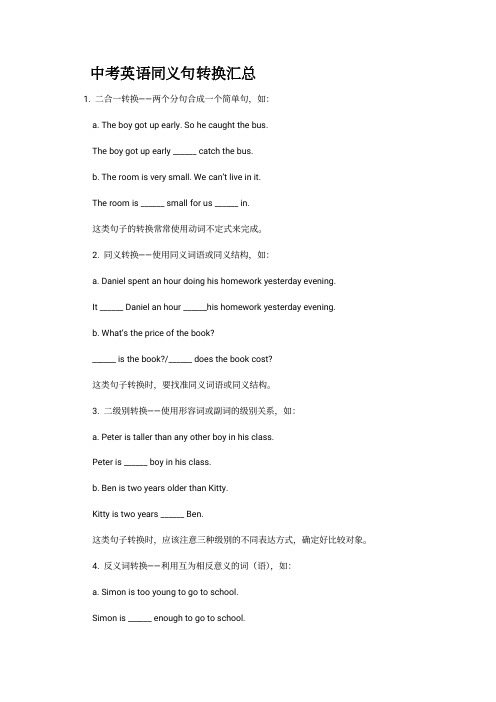
中考英语同义句转换汇总1.二合一转换——两个分句合成一个简单句,如:a.T h e b o y g o t u p e a r l y.S o h e c a u g h t t h e b u s.T h e b o y g o t u p e a r l y______c a t c h t h e b u s.b.T h e r o o m i s v e r y s m a l l.We c a n’t l i v e i n i t.T h e r o o m i s______s ma l l f o r u s______i n.这类句子的转换常常使用动词不定式来完成。
2.同义转换——使用同义词语或同义结构,如:a.D a n i e l s p e n t a n h o u r d o i n g h i s h o m e w o r k y e s t e r d a y e v e n i n g.I t______D a n i e l a n h o u r______h i s h o me w o r k y e s t e r d a y e v e n i n g.b.Wh a t’s t h e p r i c e o f t h e b o o k?______i s t h e b o o k?/______d o e s t h e b o o k c o s t?这类句子转换时,要找准同义词语或同义结构。
3.二级别转换——使用形容词或副词的级别关系,如:a.P e t e r i s t a l l e r t h a n a n y o t h e r b o y i n h i s c l a s s.P e t e r i s______b o y i n h i s c l a s s.b.B e n i s t w o y e a r s o l d e r t h a n K i t t y.K i t t y i s t w o y e a r s______B e n.这类句子转换时,应该注意三种级别的不同表达方式,确定好比较对象。
同义句转换
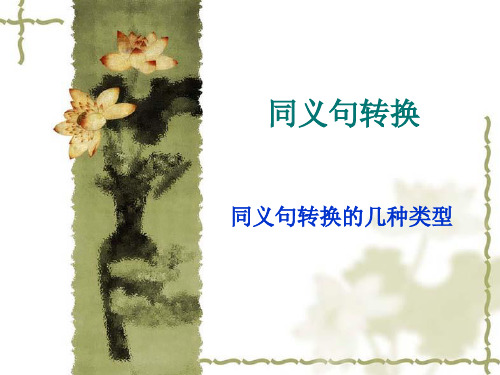
2. “Did you see her last week?” he said. He _______ _______ I had seen her the week _______.
分析:答案为asked if/ whether, before。 此题是将疑问句的直接引语转换成间接引 语。
答案:has been in。短暂动词join,意为“参加、加 入(组织,政党)”,不能与延续时间状语连用,与 延续性时间状语连用时,将join改成be in或be a member in…。
五、运用不同引语进行转换
即将直接引语变为间接引语或将间接引语 转换成直接引语。此时还要注意相关时态、 人称、动词、状语等相应的变化。如: 1. “I‟ve found my wallet,” he said to me. He _____ me that he ____ ____ his wallet. 分析:答案为told,had found。此题是将 直接引语转换成间接引语。
2.Tom borrowed a picture book from the boy just now. The boy ______ a picture book _______ Tom just now. lent;to 3.The runner couldn„t catch up with the others in the race. The runner _____ ____ the others in the race. fell behind
六、运用简单句与复合句之间的转换
复合句转化为简单句一般侧重于将从句变化 为短语或词组,使其句意简单明了。常见的 转换方法有:(1)用不定式替换、用介词短 语替换、用名词短语替换、用分词性短语替 换;(2)将宾语从句简化为“疑问词+不定 式”;(3)将so…that…(such…that…) 引导的状语从句简化为含有too…to…(或 enough to)的简单句;(4)if引导的状语从 句简化为“祈使句,and(or)+句子”。
英语同义句转换的方法

英语同义句转换的方法英语同义句转换是指将一个句子的含义保持不变,但使用不同的词语或表达方式来表达。
下面我将分享一些英语同义句转换的方法,希望对你有所帮助。
方法一:使用同义词或近义词同义词是具有相似或相同含义的词语,通过使用同义词或近义词来替换原句中的词语可以实现同义句转换。
例如:原句:The weather is beautiful today.同义句:The weather is lovely today. (beautiful - lovely)方法二:使用形容词或副词通过使用不同的形容词或副词来改变句子的表达方式,达到同义句转换的效果。
例如:原句:She speaks English fluently.同义句:She speaks English proficiently. (fluently - proficiently)方法三:使用否定词通过添加否定词或将否定词移动到不同的位置来改变句子的含义。
例如:原句:He always arrives on time.同义句:He never arrives late. (always - never)方法四:使用被动语态将主动语态的句子转换为被动语态可以改变句子的表达方式。
例如:原句:They built a new library.同义句:A new library was built by them. (built - was built by)方法五:使用倒装句将句子中的主语和谓语动词颠倒位置,形成倒装句,以此来改变句子的语序和表达方式。
例如:原句:He rarely goes to the gym.同义句:Rarely does he go to the gym. (He - Rarely)方法六:使用从句或连接词通过引入从句或使用不同的连接词来改变句子的句式和表达方式。
例如:原句:He likes both cooking and baking.同义句:He enjoys both cooking and baking. (likes - enjoys)方法七:使用同一根词的不同词形通过使用同一根词的不同词形,如名词、动词、形容词和副词,来改变句子的表达方式。
英语同义句转换例子

英语同义句转换例子当然,我可以给你一些例子。
同义句转换是一种语言技巧,可以通过改变句子的结构或使用同义词来表达相同的意思。
以下是一些例子:1. "I enjoy listening to music." 可以转换为 "I appreciate listening to music."2. "The book is very interesting." 可以转换为 "The book is highly captivating."3. "I can't believe it!" 可以转换为 "I find it hard to believe!"4. "He is a good student." 可以转换为 "He is an excellent pupil."5. "She sings beautifully." 可以转换为 "She has a beautiful voice."6. "The movie was boring." 可以转换为 "The film was tedious."7. "I feel tired today." 可以转换为 "I am exhausted today."8. "He is a doctor." 可以转换为 "He practices medicine."9. "She is always late for work." 可以转换为 "She is habitually tardy for her job."10. "I like to read books." 可以转换为 "I am fond of reading books."希望这些例子能帮助你理解同义句转换的概念。
同义句转换的常见方法

同义句转换的常见⽅法 所谓同义句转换就是将⼀个句⼦⽤另⼀种形式表达出来,⽽且意思不变。
下⾯店铺整理了同义句转换的常见⽅法,希望对你有所帮助! 同义句转换是什么意思 同义句转换就是把⼀个句⼦⽤另外⼀种结构表达出来,当然要保证句意不能改变。
同义词简介 同义词,是指词汇意义相同或相近的词语,如:美好和美妙、懒惰和怠惰、“枯萎”和“⼲枯”、“宽敞”和“宽阔”。
与“该词”意思相近的词为同义词。
(1)从词语的搭配上:如“交流”和“交换”,“交流”多偏重于虚的事物,“交换”多偏重于实的东西 (2)从语法功能上辨析:“公然”、“公开”公然;只能当状语。
“公开”可以充当状语、谓语、定语等。
同义句转换的九种类型 同义句转换题是近⼏年中考英语的⼀个常考题型,其出题形式通常是同时给出两个句⼦,第⼀句完整,第⼆句中设有⼏处空格,要求考⽣填⼊适当的词或词组,使第⼆句的意思与第⼀句意思相同。
它综合考查考⽣的语法、词汇、短语或习惯⽤语和句型结构等知识,要求运⽤所学的词汇、语法知识和句型结构填写句⼦,使句⼦结构完整、逻辑合理、语法知识⽆误、意思与所给句⼦相同。
通过对近⼏年的中考英语试题中同义句转换题的分析,我们发现中考英语同义句转换题主要考查以下⼏个⽅⾯: ⼀、运⽤同义词(组)进⾏转换 ⽤同义词或同义词组对原句中的某些词或词组进⾏替换,注意转换后的词或词组的词形变化要与句⼦其他成分相适应。
如: 1. That day we could see flowers here and there. That day we could see flowers __________. 分析:答案为everywhere。
everywhere与here and there都表⽰“到处”。
2. The teacher always takes good care of the children in the school. The teacher always_______ ______the children well in the school. 分析:答案为looks after。
九种英语同义句转换
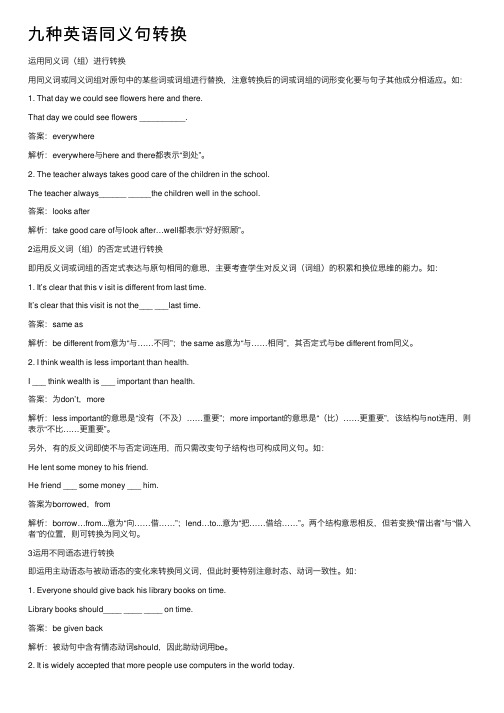
九种英语同义句转换运⽤同义词(组)进⾏转换⽤同义词或同义词组对原句中的某些词或词组进⾏替换,注意转换后的词或词组的词形变化要与句⼦其他成分相适应。
如:1. That day we could see flowers here and there.That day we could see flowers __________.答案:everywhere解析:everywhere与here and there都表⽰“到处”。
2. The teacher always takes good care of the children in the school.The teacher always______ _____the children well in the school.答案:looks after解析:take good care of与look after…well都表⽰“好好照顾”。
2运⽤反义词(组)的否定式进⾏转换即⽤反义词或词组的否定式表达与原句相同的意思,主要考查学⽣对反义词(词组)的积累和换位思维的能⼒。
如:1. It’s clear that this v isit is different from last time.It’s clear that this visit is not the___ ___last time.答案:same as解析:be different from意为“与……不同”;the same as意为“与……相同”,其否定式与be different from同义。
2. I think wealth is less important than health.I ___ think wealth is ___ important than health.答案:为don’t,more解析:less important的意思是“没有(不及)……重要”;more important的意思是“(⽐)……更重要”,该结构与not连⽤,则表⽰“不⽐……更重要”。
同义句转换口诀顺口溜

同义句转换口诀顺口溜同义句转换是英语学习中非常重要的一项技能,它可以帮助我们更好地理解和运用词汇和语法结构。
为了帮助大家更好地掌握同义句转换的技巧,我特地整理了一个有趣的口诀顺口溜,希望能够帮助大家记忆和运用。
口诀顺口溜如下:A的同位语,转同义句,前后意思不变化。
主语宾语互换位,变回原来人事物。
以谓语加逻辑,转同义句无难题。
从句转名词用it,转换没烦恼。
把主动改被动,加by不能遗漏。
把被动改主动,动词要加to。
有时态转时态,助动词一定要。
本应否定改肯定,要加助动词do。
肯定做否定,助动词变not。
把状语提到句首,意思不变化。
同义句转变形,容易又快捷。
这个口诀顺口溜总结了同义句转换中常见的技巧和规律,下面我将用一些具体的例子来解释和应用这些技巧。
首先是第一句口诀:“A的同位语,转同义句,前后意思不变化。
”这句话的意思是,当一个句子中有一个名词A,它的同位语是另一个名词B,我们可以通过换种表达方式来实现同义句的转换。
比如原句是"The cat, my pet, is very cute.",我们可以将同位语"My pet"放到句子前面:"My pet, the cat, is very cute.",这两个句子的意思是一样的。
接下来是第三句口诀:“以谓语加逻辑,转同义句无难题。
”这句话的意思是,当一个句子中的谓语动词后面有逻辑补充信息时,我们可以通过改变这个逻辑信息的表达方式来转换同义句。
比如原句是"He ran to the store.",我们可以改为"He went to the store.",这两个句子的意思是一样的。
然后是第五句口诀:“把主动改被动,加by不能遗漏。
”这句话的意思是,当一个句子中的动作是由主语进行的,并且我们想将主语改为被动结构时,需要在谓语动词前加上"by"来表示动作的执行者。
2019年英语语法:同义句转换-精选word文档 (1页)
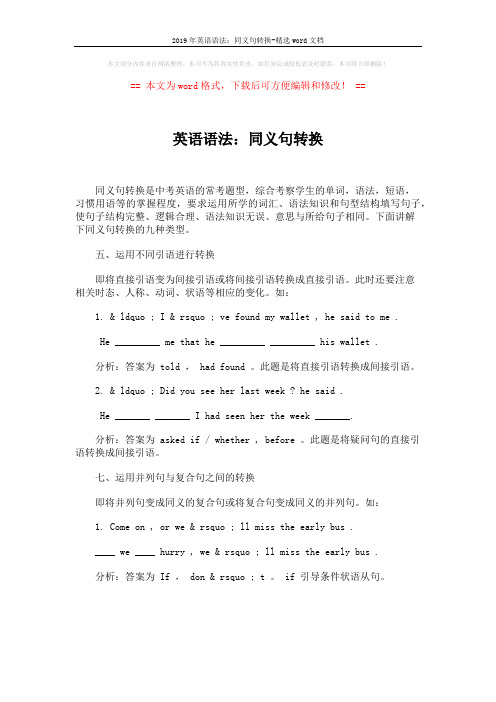
2019年英语语法:同义句转换-精选word文档本文部分内容来自网络整理,本司不为其真实性负责,如有异议或侵权请及时联系,本司将立即删除!== 本文为word格式,下载后可方便编辑和修改! ==英语语法:同义句转换同义句转换是中考英语的常考题型,综合考察学生的单词,语法,短语,习惯用语等的掌握程度,要求运用所学的词汇、语法知识和句型结构填写句子,使句子结构完整、逻辑合理、语法知识无误、意思与所给句子相同。
下面讲解下同义句转换的九种类型。
五、运用不同引语进行转换即将直接引语变为间接引语或将间接引语转换成直接引语。
此时还要注意相关时态、人称、动词、状语等相应的变化。
如:1. & ldquo ; I & rsquo ; ve found my wallet , he said to me .He _________ me that he _________ _________ his wallet .分析:答案为 told , had found 。
此题是将直接引语转换成间接引语。
2. & ldquo ; Did you see her last week ? he said .He _______ _______ I had seen her the week _______.分析:答案为 asked if / whether , before 。
此题是将疑问句的直接引语转换成间接引语。
七、运用并列句与复合句之间的转换即将并列句变成同义的复合句或将复合句变成同义的并列句。
如:1. Come on , or we & rsquo ; ll miss the early bus .____ we ____ hurry , we & rsquo ; ll miss the early bus .分析:答案为 If , don & rsquo ; t 。
if 引导条件状语从句。
初中英语句型转换和同义词转换
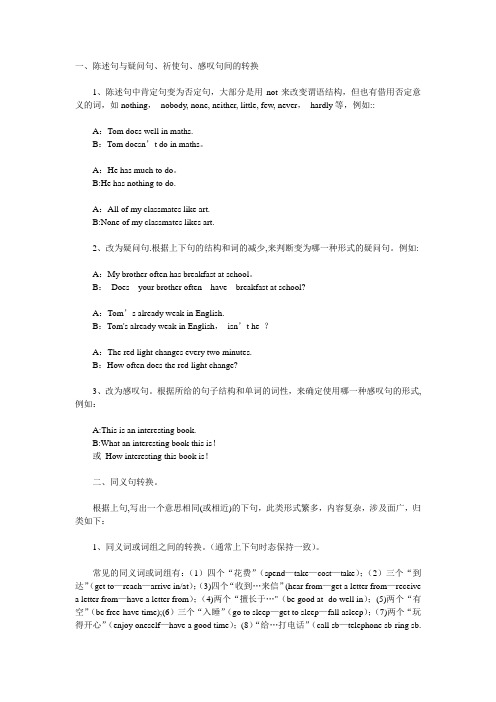
一、陈述句与疑问句、祈使句、感叹句间的转换1、陈述句中肯定句变为否定句,大部分是用not来改变谓语结构,但也有借用否定意义的词,如nothing,nobody, none, neither, little, few, never,hardly等,例如::A:Tom does well in maths.B:Tom doesn’t do in maths。
A:He has much to do。
B:He has nothing to do.A:All of my classmates like art.B:None of my classmates likes art.2、改为疑问句.根据上下句的结构和词的减少,来判断变为哪一种形式的疑问句。
例如:A:My brother often has breakfast at school。
B:Does your brother often have breakfast at school?A:Tom’s already weak in English.B:Tom's already weak in English,isn’t he ?A:The red light changes every two minutes.B:How often does the red light change?3、改为感叹句。
根据所给的句子结构和单词的词性,来确定使用哪一种感叹句的形式,例如:A:This is an interesting book.B:What an interesting book this is!或How interesting this book is!二、同义句转换。
根据上句,写出一个意思相同(或相近)的下句,此类形式繁多,内容复杂,涉及面广,归类如下:1、同义词或词组之间的转换。
(通常上下句时态保持一致)。
常见的同义词或词组有:(1)四个“花费”(spend—take—cost—take);(2)三个“到达”(get to—reach—arrive in/at);(3)四个“收到…来信”(hear from—get a letter from—receive a letter from—have a letter from);(4)两个“擅长于…"(be good at -do well in);(5)两个“有空”(be free-have time);(6)三个“入睡”(go to sleep—get to sleep—fall asleep);(7)两个“玩得开心”(enjoy oneself—have a good time);(8)“给…打电话”(call sb—telephone sb-ring sb.a call-make a telephone to sb.)(9)“飞往…”(fly to…—go to…by air/plane)(10)“自学”(teach oneself-learn…by oneself)(11)在…方面帮助help…with…-help…(to)do…(12)在…差be weak in…—do badly in…(13)能/会…can—be able to(14)更喜欢…like…better than…-prefer…to…(15)充满了…be full of…—be filled with…(16)放弃干…give up doing…—stop doing…(17)不再…no longer—not …any longer(18)照顾/保管take care of…—look after(19)展览on show—on display(20)阻止…干…stop…from doing—keep/prevent…from doing…(21)由于thanks to—because of…(22)举手hands up—put up one's hands(23)最后,终于at last-in the end(24)与…不同be different from…—be not the same as…(25)从…借入…borrow…from…—lend…to…(26)乘公汽/火车/的士go to…by bus/train/taxi-take a bus /train/taxi to…(27)乘自行车去…go to…by bike—ride a bike to…(28)为…感到自豪be proud of…—be the pride of…(29)步行去…walk to…-go to…on foot (30)独自地by oneself -alone等.例如:A:The children had a good time in the park.B:The children enjoyed themselves in the park.2、同义句型之间的转化.常见的同义句型有①It seems that 从句→Somebody seems(to be)+adj/n ②It's kind of sb. to do…→Somebody is kind to do…③What does…mean?→What do you mean by…? 或What’s the meaning of…?④There is something wrong with…→Something is wrong with…⑤not…until…与when/after/before引导的时间状语从句的转换⑥What's wrong with…?→What’s the matter with…? ⑦How is…?→What’s…like…?⑧How do you like…?→What do you think of?⑧It's time that…→It’s time for sb. to do…⑨It’s said that…→People say that…⑩Can I help you? →What can I do for you?例如:A:I went to bed after I finished my homework。
中考英语同义句转换方法归类及相关练习
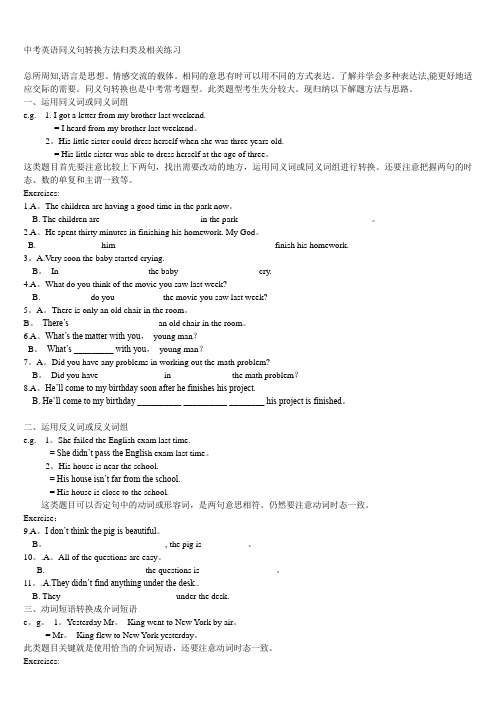
中考英语同义句转换方法归类及相关练习总所周知,语言是思想、情感交流的载体。
相同的意思有时可以用不同的方式表达。
了解并学会多种表达法,能更好地适应交际的需要。
同义句转换也是中考常考题型。
此类题型考生失分较大。
现归纳以下解题方法与思路。
一、运用同义词或同义词组e.g. 1. I got a letter from my brother last weekend.= I heard from my brother last weekend。
2。
His little sister could dress herself when she was three years old.= His little sister was able to dress herself at the age of three。
这类题目首先要注意比较上下两句,找出需要改动的地方,运用同义词或同义词组进行转换。
还要注意把握两句的时态、数的单复和主谓一致等。
Exercises:1.A。
The children are having a good time in the park now。
B. The children are__________ ____________ in the park _________ _________ ___________。
2.A。
He spent thirty minutes in finishing his homework. My God。
B._____ _________ him ________ _________ _________ ________ finish his homework.3。
A.Very soon the baby started crying.B。
In ________ ___________ the baby _________ ________ cry.4.A。
- 1、下载文档前请自行甄别文档内容的完整性,平台不提供额外的编辑、内容补充、找答案等附加服务。
- 2、"仅部分预览"的文档,不可在线预览部分如存在完整性等问题,可反馈申请退款(可完整预览的文档不适用该条件!)。
- 3、如文档侵犯您的权益,请联系客服反馈,我们会尽快为您处理(人工客服工作时间:9:00-18:30)。
运用同义词(组)进行转换用同义词或同义词组对原句中的某些词或词组进行替换,注意转换后的词或词组的词形变化要与句子其他成分相适应。
如:1. That day we could see flowers here and there.That day we could see flowers __________.答案:everywhere解析:everywhere与here and there都表示“到处”。
2. The teacher always takes good care of the children in the school.The teacher always______ _____the children well in the school.答案:looks after解析:take good care of与look after…well都表示“好好照顾”。
即用反义词或词组的否定式表达与原句相同的意思,主要考查学生对反义词(词组)的积累和换位思维的能力。
如:1. It’s clear that this v isit is different from last time.It’s clear that this visit is not the___ ___last time.答案:same as解析:be different from意为“与……不同”;the same as意为“与……相同”,其否定式与be different from同义。
2. I think wealth is less important than health.I ___ think wealth is ___ important than health.答案:为don’t,more解析:less important的意思是“没有(不及)……重要”;more important的意思是“(比)……更重要”,该结构与not连用,则表示“不比……更重要”。
另外,有的反义词即使不与否定词连用,而只需改变句子结构也可构成同义句。
如:He lent some money to his friend.He friend ___ some money ___ him.答案为borrowed,from解析:borrow…from...意为“向……借……”;lend…to...意为“把……借给……”。
两个结构意思相反,但若变换“借出者”与“借入者”的位置,则可转换为同义句。
即运用主动语态与被动语态的变化来转换同义词,但此时要特别注意时态、动词一致性。
如:1. Everyone should give back his library books on time.Library books should____ ____ ____ on time.答案:be given back解析:被动句中含有情态动词should,因此助动词用be。
2. It is widely accepted that more people use computers in the world today.It is widely accepted that computers ____ widely ___ in the world today.答案为are,used解析:computers是复数名词,助动词用are。
即非延续性动词与延续性动词进行转换,此时往往会涉及时态的变化。
如:1. The manager left two hours ago.The manager _____ ____ ____ for two hours.答案:has been away解析:leave为非延续性动词,不能与for two hours这样的一段时间连用,而改成be away这样的延续性动词后,则可连用一段时间。
2. The film began five minutes ago.The film has been _____ _____ five minutes.答案:on for解析:has been提示时态是现在完成时态,“for 时间段”表示“持续(一段时间)”,常用在含有现在完成时态的句子里。
3. Mr Li joined the Party twenty years ago.Mr Li _____ _____ _____ the Party for twenty years.答案:has been in解析:短暂动词join,意为“参加、加入(组织,政党)”,不能与延续时间状语连用,与延续性时间状语连用时,将join改成be in或be a member in…。
即将直接引语变为间接引语或将间接引语转换成直接引语。
此时还要注意相关时态、人称、动词、状语等相应的变化。
如:1.“I’ve found my wallet,” he said to me.He _________ me that he _________ _________ his wallet.答案:told,had found解析:此题是将直接引语转换成间接引语。
2. “Did you see her last week?” he said.He _______ _______ I had seen her the week _______.答案:asked if/ whether, before解析:此题是将疑问句的直接引语转换成间接引语。
即将简单句变成同义的复合句或将复合句变成同义的简单句。
如:1. We didn’t go out for a walk because it was raining.We didn’t go out for a walk _______ _______ the rain.答案:because of解析:将原因状语从句because it was raining改为表示原因的介词短语because of the rain。
2. He was so excited that he couldn’t go to sleep.He was ______ ______ ______ go to sleep.答案:too excited to解析:将so…that…换成too…to…结构,原句的that从句为结果状语从句,改写句中的不定式仍表结果。
3. Now I will show you how to do the work.Now I will show you ______ ______ ______ do the work.答案:how you can解析:即将原句中的“疑问词+不定式”结构转换成宾语从句。
4. You should put them back after you use them.You should put them back _____ _____ them.答案:after using解析:即将after引导的状语从句改写为after引导的介词短语。
即将并列句变成同义的复合句或将复合句变成同义的并列句。
如:1. Come on, or we’ll miss the early bus.____ we ____ hurry, we’ll miss the early bus.答案为If,don’t解析:if引导条件状语从句。
2. The man gave us a talk last week. He will give us another talk this week.The man _____ gave us a talk last week _____ _____ us another talk this week.答案为who/ that,will give解析:who/ that gave us a talk last week为定语从句,修饰先行词the man。
即运用关联连词b oth…and…,neither…nor…,either…or…,not only…but also…等将两个简单句合并为一个简单句。
此时要注意的是,both…and…连接两个主语时,谓语总是用复数,而neither…nor…,either…or…,not only…but also…连接两个主语时,谓语动词通常应与靠近的主语保持一致。
如:1. Tom can’t speak Japanese well and Jim can’t, either.______ Tom ______ Jim can speak Japanese well.答案:Neither,nor解析:neither…nor…表示“……和……(两者)都不”,刚好与原句的两个否定结构的意思相吻合。
2. Alice has read the book and Peter has read it, too.______ Alice ______ Peter have read the book.答案:Both,and解析:both…and…的意思是“……和……(两者)都”。
3. This store sells men’s shoes, and it also sells men’s clothes.This store sells ______ ______ men’s shoes ______ ______ men’s clothes.答案:not only,but also解析:not only…but also…表示“不仅……而且……”之意。
这类典型结构如so…that…,too…to…,enough to,not…until…,so do I 等。
如:1. Jim wants to go boating and his parents want to go boating, too.Jim wants to go boating, and ______ ______ his parents.答案:so do解析:句意为“……他的父母也一样(一样想去)”。
2. John went to bed after he finished his homework.John ______ go to bed ______ he finished his homework.答案:didn’t,until解析:not…until意为“直到……才”。
